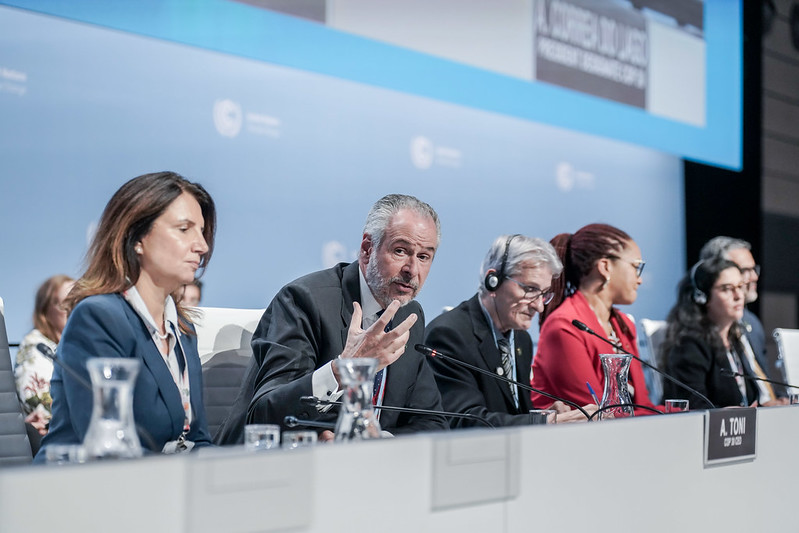On the 10th anniversary of the Paris Agreement, with the world plagued by extreme events and fractured by conflicts, the 30th United Nations Climate Change Conference (COP30) faces the challenge of looking ahead and pushing for progress while keeping its feet on the ground. The international context poses obstacles to multilateralism at a moment when countries should disclose their next climate targets — the so-called 3.0 NDCs —, and push for cutting emissions and financing resilience.
“It is one of the most important COPs in recent times, because according to the Paris Agreement itself, we need to discuss now how the next 10 years will look like”, notes Maria Netto, the executive director of the Institute for Climate & Society (iCS), from Brazil. “But we are in a very different geopolitical moment than we were last year. Ambitions must be guided by this reality”, she warns.
This does not necessarily mean having more modest goals, but rather building on what has already been agreed upon in the last years, analysing successful examples and moving on to implementation. “It’s time for the action agenda. There are many things being done in various countries that deserve recognition”, Netto continues.
Adrián Fernández, executive director of the Climate Initiative of Mexico (ICM), agrees: “If we leave aside the United States, which is abandoning the Paris Agreement, large countries such as India and China — and, to a certain extent, Brazil — have unequivocally embraced the climate agenda with projects and policies”. He also cites the European Union and its New Green Deal. “These initiatives push the ambition for more progress. But the current scenario, of course, is not free of challenges”, he concludes.
These ideas match with concepts disclosed by the COP30 Presidency in its letters for the COP community. In March, in his first letter as COP30 president, the Brazilian ambassador André Corrêa do Lago reminded the Paris Agreement outcomes. “As negotiations emanating from COP21 conclude, we must refocus our efforts on action and implementation. Words and text must be translated into actual practice and transformations on the ground. The credibility and strength of the regime hinge upon it”.
The example of Brazil and the global south
The 30th Conference of the Parties, COP30, will be held in Belém do Pará, in Brazil. The city is one of the capitals of the northern Brazilian states, located at the mouth of the Amazon River, in the heart of the largest tropical forest on the planet. These factors encourage conference observers, as they allow the focus of the debates to be on solutions based on nature and local communities — something in which the Amazon, Brazil and Latin America are rich.
“COP30 is an opportunity for Latin America to address priority issues in the region, such as the relationship between biodiversity and climate change”, says Fernández. “If we finally manage to reduce deforestation and significantly increase restored areas, we will be doing a lot for the planet”, he notes. Maria Netto adds to this agenda the debate around food systems.
Hosted in a global south nation, COP30 could work as a hub for “strengthen the collective voice of developing countries”, in the perspective of Shakti Sustainable Energy Foundation, from India. “It allows us to emphasize the shared priorities and challenges of nations disproportionately affected by climate change, despite contributing the least to it”, states the organisation.
Actors from the global north are also welcoming the occasion for collaboration and knowledge exchange, as suggests the European Climate Foundation (ECF): “COP30 it is an opportunity to connect Europe’s climate leadership with solutions emerging from other regions and to secure stronger international cooperation on finance and implementation”.In November, iCS, ICM, ECF — along with other five philanthropic organisations from four continents — will meet in the RCF pavilion, in the Blue Zone. The space aims to be a place to create solutions rooted in local realities and aligned with global ambitions.
Applications are now open for organisations and partners that want to submit proposals of lectures, debates and cultural activities for the space.
‘Mutirão’, the global call for collaboration
The idea of collaboration was already launched by COP30 Presidency in its first letter to the community, when Corrêa do Lago presented the concept of “mutirão”, a word from Brazilian native indigenous peoples that means collective work. “By sharing this invaluable ancestral wisdom and social technology, the incoming COP30 presidency invites the international community to join Brazil in a global “mutirão” against climate change, a global effort of cooperation among peoples for the progress of humanity”.
More than 30 years ago, Brazil was the host of the Rio-92 Conference, when the United Nations Framework Convention on Climate Change (UNFCCC) was established. On that, countries agreed to combat “dangerous human interference with the climate system” and to stabilize greenhouse gas concentrations in the atmosphere. This is the basis of COPs meetings.
“For COP30, we need to maintain trust and create dialogue. And trust is not just about the global south, it’s not just about the global north, it’s about bringing everyone to the table and being able to dialogue. Brazil has this capacity”, thinks Maria Netto, from iCS.
“It is a huge opportunity for us to show that multilateralism can be preserved. We just need to understand that there is no magical COP presidency, no brilliant Brazil, that can solve everything if, at the time of negotiations, tensions are escalating out of control”, concludes Netto.

